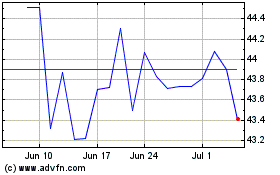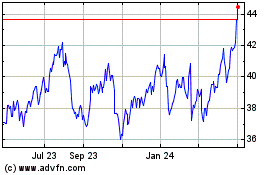By Simon Clark and Margot Patrick
LONDON -- HSBC Holdings PLC said it would cut 35,000 jobs and
$100 billion in assets in the next three years as it scales back
operations in the U.S., mainland Europe and its investment
bank.
Europe's biggest bank by assets plans to invest more in its
fast-growing Asian and Middle Eastern operations to boost profit.
HSBC operates in more than 50 countries but makes half its revenue
in Asia.
The bank said Tuesday that net profit fell 53% to $5.97 billion
last year, hit by a goodwill impairment of $7.3 billion.
HSBC's London-listed shares were down 6% Tuesday as the bank
said it would suspend share buybacks for two years, and analysts
said the restructuring plans came with significant risks.
The benefits of the restructuring will be evident largely from
2023 onward, said Citigroup analyst Ronit Ghose, who recommended
investors sell HSBC shares.
The 155-year-old lender is reorganizing its business as
political challenges destabilize its main markets, with uncertainty
about the U.K. economy as it leaves the European Union,
antigovernment protests in Hong Kong and trade tensions between the
U.S. and China.
HSBC still faces substantial challenges in its key markets in
the U.K., Hong Kong and mainland China, Chairman Mark Tucker
said.
The bank is monitoring the impact of the coronavirus outbreak
and has reduced its expectations for Asian economic growth in 2020
as a result, Mr. Tucker said. The bank said loan losses could rise
and revenue could fall if the outbreak is prolonged.
The restructuring of the London-based bank is being led by Chief
Executive Noel Quinn, who replaced John Flint in August on an
interim basis. Mr. Quinn is vying for the permanent role of CEO,
which the bank said will be decided this year.
HSBC will be "exiting businesses where necessary," Mr. Quinn
said.
"Around 30% of our capital is currently allocated to businesses
that are delivering returns below their cost of equity, largely in
global banking and markets in Europe and the U.S.," he noted.
HSBC Chief Financial Officer Ewen Stevenson told journalists
there will be "meaningful job cuts" in HSBC's investment bank and
headquarters in London.
The bank, which employs 235,000 people, expects to incur around
$7.2 billion of costs because of the restructuring in the next few
years.
The strategy pulls HSBC closer to its Asian roots. The bank was
founded in 1865 in Hong Kong and Shanghai to finance trade with
Europe. London will remain a hub for the investment bank, but
increasingly play a supporting role to operations in Hong Kong and
Singapore.
HSBC's retail and commercial bank serving U.K. customers
remained "very important," Mr. Quinn said, adding that he expects
it to become increasingly tied to the rest of the world as the
country leaves the European Union.
Globally, the lender will combine its retail banking, wealth
management and private bank into one unit to cut costs.
"It means we can remove many layers and support structures," Mr.
Quinn said.
António Simões, the CEO of HSBC's private bank, will leave later
this year.
In continental Europe, where HSBC's French business is up for
sale, HSBC plans to reduce its risk-weighted assets by 35% by the
end of 2022.
In its long-struggling U.S. arm, Mr. Quinn said HSBC will cut
assets in investment banking and markets by almost half, and shut
around 70 of its 229 branches.
As of September, HSBC was the U.S.'s 14th largest commercial
bank according to Federal Reserve data, with around $181 billion
assets. Mr. Quinn said he had considered putting the unit up for
sale but decided against it because the U.S. is a crucial part of
the bank's global network.
In mainland China, HSBC has for years positioned itself to take
advantage of growing economic ties between the world's most
populous nation and the wider world, but that integration is now
challenged by the trade conflict with the U.S.
"The agreement of a phase-one trade deal between China and the
U.S. is a positive step, but we remain cautious about the prospects
for a wider-ranging agreement given disagreements that still exist,
particularly over technology," Mr. Tucker said.
Mr. Quinn, formerly global commercial-banking head at HSBC, was
elevated after Mr. Tucker decided new leadership was needed, ending
Mr. Flint's three-decade career at the bank with limited public
explanation.
Mr. Tucker brushed aside questions Tuesday about whether it made
sense for Mr. Quinn to announce a restructuring when he may not see
the changes through. He said the restructuring and the selection of
the new CEO were separate processes running in parallel.
Write to Simon Clark at simon.clark@wsj.com and Margot Patrick
at margot.patrick@wsj.com
(END) Dow Jones Newswires
February 18, 2020 06:39 ET (11:39 GMT)
Copyright (c) 2020 Dow Jones & Company, Inc.
HSBC (NYSE:HSBC)
Historical Stock Chart
From Mar 2024 to Apr 2024

HSBC (NYSE:HSBC)
Historical Stock Chart
From Apr 2023 to Apr 2024
